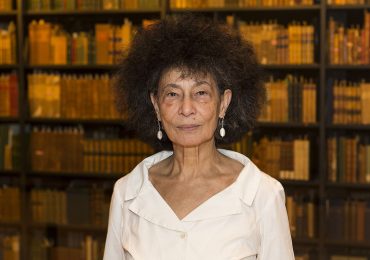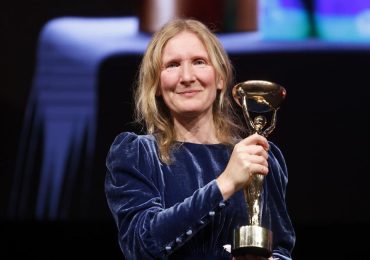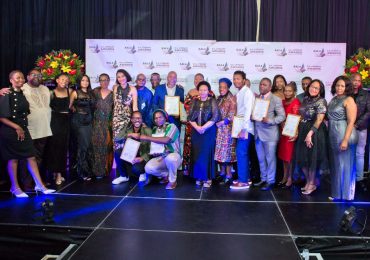Renowned activist, writer, playwright and director Ronnie Govender has died, aged eighty-six.
He passed away in Cape Town on 29 April 2021 from age-related illnesses.
Govender’s writing explores the resilience, vitality and pain of the lives of the South African Indian community, and was vital to the conception of a complex South African imaginary. He will also be remembered for his pioneering work in various anti-apartheid sporting, cultural and literary organisations.
Sathiseelan Gurulingam Govender, more popularly known as Ronnie, was born on 16 May 1934 in Cato Manor in Durban, one of eleven children. His paternal and maternal grandparents had come from South India as indentured labourers.
‘I used to devour any kind of reading material, at that time. I think it was a kind of family tradition in that respect. My father, despite the fact that he only went to standard two, would read the newspaper from the first letter to the last full stop.’
—Ronnie Govender, from an interview with Mwelela Cele, University of Durban-Westville Documentation Centre, Oral History Project
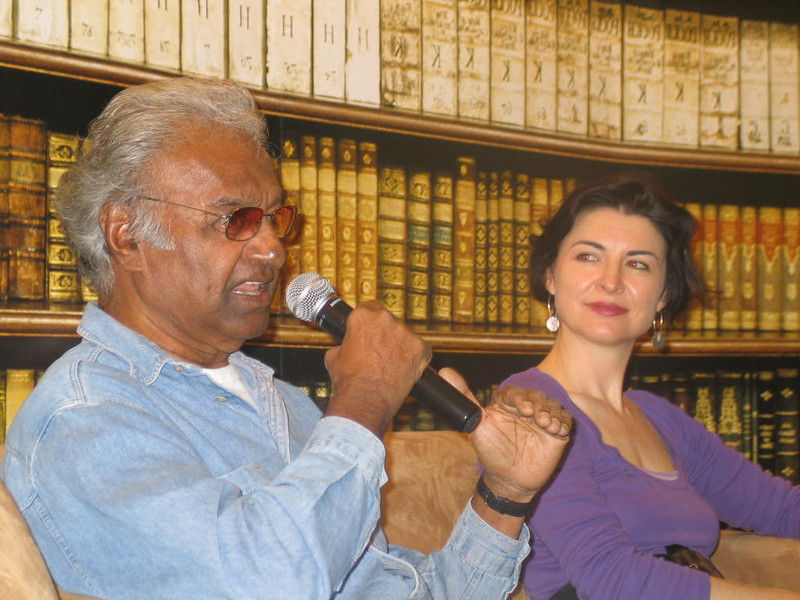
Govender attended school in Cato Manor, before spending a year studying law at the University of Cape Town, in 1954, where he became treasurer of the Students Democratic Association, formed to protest against the exclusion of African students from outside South Africa attending universities in the country. Former Constitutional Court judge Albie Sachs was president of association at the time.
Govender worked as a sports journalist at the New Age, using his wages to pay his university fees, but when the newspaper was banned he was forced to return to Durban, and enrolled at Springfield Training College to become a teacher. He worked as a teacher for eleven years, before being forced out because of his political activism.
‘I attacked racism in sport also. And I think at that early stage, I had also attracted the attention of the Special Branch. Because my articles were quite outspoken about this kind of racism and the fact that I mean Blacks couldn’t represent this country.’
—Ronnie Govender, Ibid.
Govender’s first play, ‘Beyond Calvary’, based on a couple he had known from two different religious backgrounds, Hindu and Catholic, came out of a writing workshop he was persuaded to attend under the renowned American director Krishna Shah in 1962. Shah selected it to be staged, where it impressed Fatima Meer and Alan Paton.
In 1964 Govender and a group of theatre enthusiasts, including Muthal Naidoo, created the Shah Theatre Academy, in order to ‘create theatre that reflected our lives’. It went on to train several leading actors, directors and playwrights.
‘We felt that we had to then reflect our lives honestly and sincerely and that meant that we had to reflect political realities of life. Whether you were white, brown or whatever, you know. And the political realities were such that it affected every aspect of our lives of this country. Even if you wrote about those things that seemed to be non-political, so-called non-political. In some way or the other because life was so extensively affected by apartheid it was inevitable that you would reflect on that. And so we wrote from that perspective.’
—Ronnie Govender, Ibid.
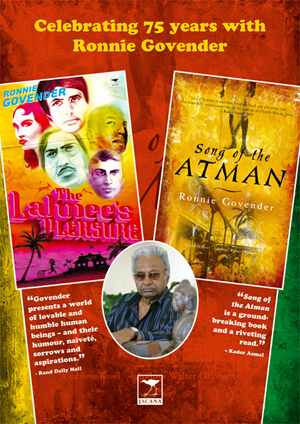
In 1972 Govender wrote his most celebrated work, ‘The Lahnee’s Pleasure’, which become one of South Africa’s longest running plays. It was performed for thousands of people at community venues across South Africa, but in line with the cultural boycott of the time, Govender refused invitations for it to be performed at ‘establishment’ venues and in London.
‘I think what informs my work is the plight of ordinary people and when you write about ordinary people it is inevitable you take into cognisance the political realities that impact on the lives of those people.’
—Ronnie Govender, Ibid.
Perhaps Govender’s best known play, ‘At the Edge’, was performed all over the world, however, including at the Edinburgh Festival, as well as in Glasgow, Toronto, and a number of cities in India. It was adapted from a short story he had written about the forced removals in Cato Manor, which happened after 1958. The resulting short story collection, At the Edge and Other Cato Manor Stories, was published in 1996 and won the Commonwealth Writers Prize for Best First Book, Africa Region. It became the first South African novel to be published for wide distribution in India, under the title, Black Chin, White Chin.
‘I think all sorts of sensitive people, particularly writers, felt very strongly about the way communities were destroyed by apartheid […] we have all had this sense of belonging to those places. That is inevitable because it is human nature to be close to your hearth. And when your hearth gets destroyed, especially by foul means like this, the pain is one that endures. It doesn’t just go away.’
—Ronnie Govender, Ibid.
In 1991, Govender was appointed Marketing Manager of the Baxter Theatre and, in 1993, Director of the Playhouse Theatre Complex and Artistic Director of Drama.
His first novel, Song of the Atman, which tells the story of five generations of Indian indentured labourers, loosely based on the life of one Govender’s uncles, was shortlisted for the European Union Literary Award in 2005 and the Commonwealth Prize in 2006. The book was described by Kader Asmal as ‘a sublime novel … a South African classic in the making’ and by Pallo Jordan as ‘a major literary event … a tapestry admirably woven with words’.
‘[My mother] said: “There is god in every human being, in every bit of life god is there. You must find the god within other people.” And that to me is important, that is my guiding principle in life.’
—Ronnie Govender, Ibid.
Govender’s other works include the plays ‘The First Stone’, ‘His Brother’s Keeper’, ‘Nineboy’, ‘Swami’, ‘Off Side’, its sequel ‘Inside’, and ‘Blossoms from the Bough’, written in 1987 for the Culture in Another South Africa (CASA) conference in Amsterdam, the Netherlands. His final work, In the Manure, a book of personal reflections, was published in 2008.
He was a founding member of the Congress of South African Writers, a non-racial body in opposition to apartheid. Outside of literature, Govender was an executive member of the non-racial body the South African Soccer Federation (SASF), and was a foundation member of the non-racial South African Council on Sport (SACOS).
Govender’s awards include the AA Vita Award for lifelong contribution to the theatre, a Playwright of the Year Award for At the Edge, and, in 2000, the English Academy Medal for his contribution to South African English literature.
In 2006, Govender was awarded the Literary Lifetime Achievement Award by the Department of Arts and Culture, in 2007, the Lifetime Achievement Award from the Arts and Culture Trust, and in 2008 he was awarded the Order of Ikhamanga, South Africa’s highest national honour, in Silver for his ‘excellent contribution to democracy and justice in South Africa through the genre of theatre’. In 2014, the Durban University of Technology conferred an Honorary Doctor of Technology in Arts and Design upon Govender ‘for his contribution to literature and the arts in general as well as his contribution to democracy, peace and justice in South Africa through theatre’.
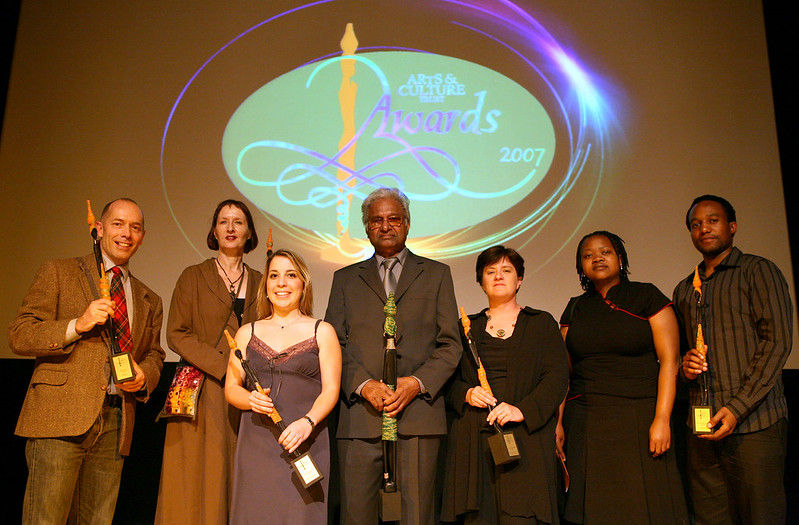
From left to right: Athol Hay (Jikileza): ACT Chairperson’s Award; Georgina Thomson: ACT Arts Management Award; Nadia Neophytou: ACT Arts Correspondent Award; Ronnie Govender: ACT Lifetime Achievement Award; Colleen Higgs (The Community Publishing Project): ACT Cultural Development Award; Mathapelo Matabane and Lesego Mokonoto (Buskaid): ACT Arts Education Project Award
His Order of Ikhamanga profile reads:
Ronnie Govender is a treasure of South Africa who embodies the social and cultural experience he has so creatively documented […]
His contribution to the South African theatre has been remarkable. He has led from the front, and, despite apartheid, managed to pursue his illustrious career, in the process lifting the standard of theatre in South Africa.

